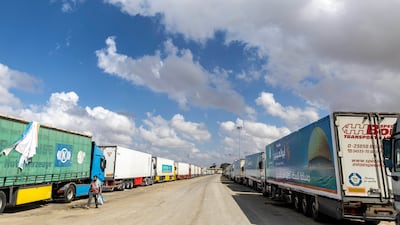Reda Youssef is a veteran of Egypt's last war against Israel in 1973, a conflict ignited by a surprise attack by Egyptian troops to retake the Sinai Peninsula.
He was part of a band of 10 soldiers called “tank hunters”, who were armed with Soviet-made Malyutka missiles. However, he was wounded by shrapnel six days into the war and brought back to Cairo for treatment.
Fifty years later, Egypt finds itself in a new battle over Sinai, against what it sees as an Israeli campaign to forcibly relocate Palestinians from the Gaza Strip to the peninsula.
Mr Youssef, now 77 and nursing a broken hip, brims with joyful energy when he recounts crossing the Suez Canal into Sinai on the east bank of the waterway at 4.30pm on October 6, 1973.
“It felt amazing to be part of a great thing like fighting to liberate Sinai,” he told The National.
"When I was wounded and taken to Suez [city], women there gave me corned beef and cigarettes. When I got to the hospital in Cairo, they took away my helmet and rifle, gave me a bath, a half-grilled chicken and five pounds.
“Those were days when people and the army were genuinely united because we were liberating our land.”
Six years after the 1973 Arab-Israeli war, Egypt signed a historic treaty with Israel.
Subsequently, Sinai, a vast region of arid desert, mountains and sandy beaches captured by Israel in 1967, was handed back to Egypt amid nationwide celebrations.
The day the last piece of land was returned to Egypt in April 1982 has become a national holiday that is celebrated to this day.
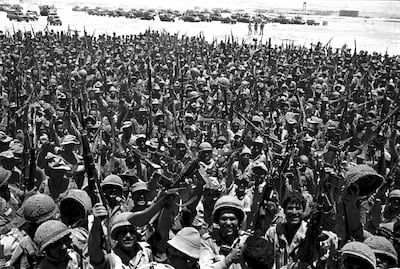
Sinai has historically served as Egypt's eastern gateway, with the country's armies marching through the region to take on enemies to the east.
Its land was often soaked by rivers of blood shed by soldiers defending their country against foreign invaders, of which there has been no shortage: Hyksos, Persians, Greeks, Romans, Arabs, Crusaders and Ottomans.
In modern times, tens of thousands of Egyptian soldiers perished fighting in four wars against Israel between 1948 and 1973.
Sinai is now back on the centre stage in Egypt, but not because of another invasion.
Egypt says it is deeply alarmed and angered by suggestions that Israel's relentless bombardment of the Gaza Strip, launched in retaliation to a deadly attack by the Hamas militant group that rules the coastal enclave, could force Palestinians living there to flee into Sinai.
There is a fear that is fast gaining traction in the country that this is an attempt to make Sinai the Palestinians' homeland rather than the independent state they are demanding to have in Gaza and the occupied West Bank.
President Abdel Fattah El Sisi, a former general facing re-election in December, warned on Wednesday that, if necessary, he would call upon the nation's 105 million people to take to the streets in support of his handling of the issue.
“The movement of Palestinian citizens from the Gaza Strip to Sinai is, to put it very simply, a transfer of the ideology of resistance and fighting from Gaza to Sinai,” Mr El Sisi said.
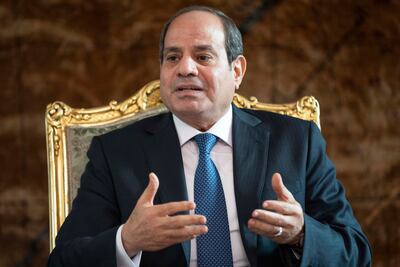
“That will make Sinai a base from which operations against Israel will be launched and Israel consequently will be within its right to self-defence and to protect its national security by striking back on Egyptian territory.”
Hours after he made these comments, the Egyptian senate held an emergency session and overwhelmingly adopted a motion supporting Mr El Sisi's policy on the Gaza war and his defence of the country's national interests, a reference to Sinai.
The lower chamber followed suit on Thursday, with some members calling for Egypt to go to war against Israel for the sake of the Palestinians, while others called for the repeal of the peace treaty between the two countries.
“It is only fitting that this agreement be dealt with in the house of deputies like this,” legislator Ahmed Al Borolossi screamed as he tore up a copy of Egypt’s US-sponsored 1978 Camp David Accords with Israel, which provided the basis for peace between the two neighbours and included a blueprint for a Middle East settlement.
Another MP, talk show host Mustafa Bakry, was just as dramatic. “No peace or agreements with the murderers ... war is the solution," shouted the legislator who, like most of his peers in the chamber on Thursday, wore the traditional Palestinian black-and-white scarf.
Both houses of parliament are packed with supporters of Mr El Sisi.
The Gaza crisis and the widely publicised alarm over the possible resettlement of Gaza's Palestinians in Sinai have energised Mr El Sisi's supporters ahead of the December election, in which he is expected to secure a third consecutive term in office.
Social media content creators loyal to Mr El Sisi have flooded platforms with calls for Egyptians to rally behind the President, praising his policy on Gaza and what they see as the lofty status he has gained on the international stage. Generous tributes were also paid to the army.
“We are with you, no matter what happens,” said one of the slogans posted online by supporters of Mr El Sisi.
Influential talk shows on government-influenced television networks have taken a similar approach while stoking anti-Israel and anti-western sentiment.
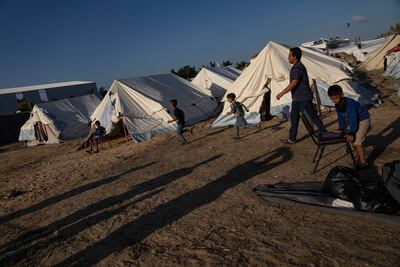
Rumours are circulating that Mr El Sisi turned down numerous offers made by western leaders to cancel most of his country’s foreign debt – more than $160 billion – in exchange for allowing Palestinians from Gaza to resettle in Sinai.
“History teaches us to be wary of the intentions of Israel, which will have no qualms about throwing Palestinians out of their homes and never allowing them back. Israel has mastered this game over the years,” said Mohamed Anis Salem, a former career diplomat who now sits on the Egyptian Council for Foreign Relations, a think tank.
“But I think the popular rhetoric on Israel’s intentions and the debt forgiveness offers by far exceed the facts on the ground. I see the issue of the Gaza war to be linked to the domestic politics of all relevant parties,” he said.
The Gaza crisis, the perceived danger stalking Sinai and the intense pro-government media campaign have combined to shift the focus of many Egyptians away from the country's crushing economic crisis.
Record inflation, a weakening currency and a crippling foreign currency shortage had, before the outbreak of the Israeli-Hamas war, been expected to influence how Egyptians voted in December.
“If food is dear, the homeland is much dearer,” said a post on social media by a pro-government group, apparently seeking to play down the significance of the economic crisis when the nation is facing a perceived security threat.
Meanwhile, the government and associated bodies are determined to make what has been portrayed as an existential issue – protecting the homeland against a perceived western-backed Israeli conspiracy, effectively replacing the economic crisis as the dominant national conversation topic.
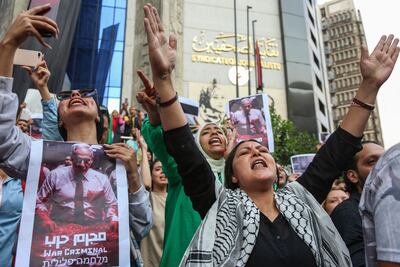
Pro-government parties, associations and groups called on Egyptians to rally in support of Mr El Sisi on Friday to show what one appeal described as the “unity of Egypt's people and government in the face of the threats to liquidate the Palestinian cause, harm Egypt's national security and its territorial integrity”.
The proposed rallies will take place at designated squares in the capitals of Egypt's 27 provinces.
Rallying on the streets has been the exclusive privilege of Mr El Sisi’s supporters since a ban on street protests was introduced in 2013.
However, thousands of students at a half dozen universities in Cairo and elsewhere in Egypt staged noisy demonstrations in support of Palestinians. Activists also rallied in small groups outside professional unions.
Slogans supporting the Palestinian cause and condemning Israel’s bombardment of Gaza were zealously chanted, but not without including some chants critical of Mr El Sisi and his government.
"No [Palestinian] resettlement and no mandate," was one chant outside the Journalists' Union on Thursday night. It referred to Mr El Sisi's occasional calls for a popular mandate when faced with a pressing national issue that required drastic action.
